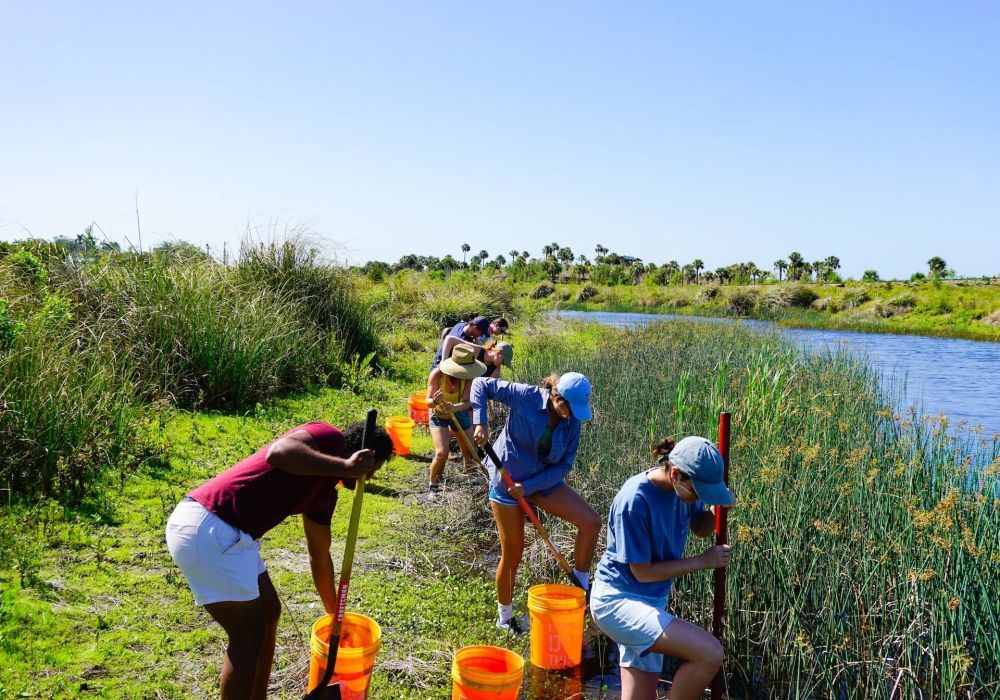
News
How to mainstream NBS across all levels of education
12 December 2023
How can nature-based solutions (NBS) be mainstreamed across all levels of education, from early and primary education to higher education and professional training? The first NBS EduCommunity workshop organised by the NBS EduWORLD project gathered a pan-European community around the topics of NBS and education to identify windows of opportunity for uptake of NBS education and to promote exchange and mutual learning. The online event on 28 November 2023 brought together a wide range of interested stakeholders, ranging from teachers, students/youth, to NBS practitioners and third sector organisations, among others.
Following two insightful keynotes by Guia Bianchi, Researcher at the Joint Research Center (European Commission) and co-author of the GreenComp framework, and Prof. Arjen Wals, Professor at the University of Wageningen and UNESCO Chair of Social Learning and Sustainable Development and specialist of the Whole School approaches, participants had the opportunity to exchange their views. Smaller groups discussed how to mainstream NBS education in early and primary education on one side, and in higher education and professional training on the other.
Here are some of the key takeaways from the discussions about implementing Nature-Based Solutions (NBS) in education:
1. Benefits of NBS in Education: The examples highlighted various benefits, including skill development, innovative teaching methods, enhancing community science capital, fostering responsible citizenship, and improving mental and physical well-being. The open schooling and whole school approaches emerged as effective pathways for integrating NBS in education, addressing concerns like pedagogies, curriculum alignment, and community connections.
2. Collaboration and stakeholder engagement: Collaboration between various stakeholders—teachers, researchers, non-formal educators, external partners like professionals, municipalities, universities, and parents—was emphasized. Sharing responsibility for children's education, practical issues, financial support, and knowledge exchange were key points.
3. Practical application: The importance of practical implementation of NBS was stressed. Examples, peer exchanges, showcasing good practices, and conferences were seen as effective ways to understand and implement NBS in action.
4. Interdisciplinary approach: Integrating NBS into different educational levels and disciplines was discussed. Encouraging collaboration among different universities and disciplines, embedding NBS into various courses beyond environmental sciences, and addressing gaps in understanding when and how NBS is taught were highlighted.
5. Skill diversity and collective solutions: Acknowledgment that addressing significant challenges requires a diverse range of skills across different individuals. Collective work and multidisciplinary approaches were encouraged to address complex challenges effectively.
6. Policy and education integration: The need to embed NBS into existing education structures, sustainability policies, and legal frameworks was highlighted. Advocating for clearer definitions, better cooperation among stakeholders, and inspiring future generations through education were emphasized.
7. Urban planning and sustainability: Encouraging city planning to include more green areas, engaging people with nature, inspiring sustainable choices, and motivating individuals towards sustainable practices were key discussion points.
Overall, the discussions emphasized practical application, interdisciplinary collaboration, education integration, policy advocacy, and fostering a mindset shift towards sustainability and nature-based solutions across various sectors and educational levels.
This unprecedented workshop gathering the NBS and education community will take place again in 2024 and 2025. Are you interested in contributing? Register to NBS EduWORLD newsletter or follow the project on social media to be informed of all events and consultation opportunities!
Image (The Tampa Bay estuary program on Unsplash)
All news

NBS EduWORLD is funded by the European Union (Grant Agreement No. 101060525). Views and opinions expressed are however those of the author(s) only and do not necessarily reflect those of the European Union or the European Commission. Neither the European Union nor the granting authority can be held responsible for them.
